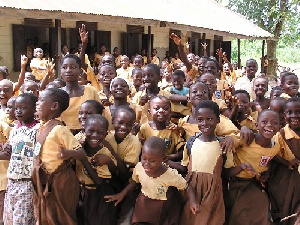 Parents urged to give children good sex education (File Photo)
Parents urged to give children good sex education (File Photo)
Parents, guardians and teachers have been cautioned against using nicknames for their children’s genital organs instead of their correct names as that prevents them from appreciating their body parts.
Most parents use nicknames such as loloi, biscuit, v-jay, totoikokoli, bombom, langalanga, among others to refer to the vagina and penis for girls and boys respectively.
Mrs Margaret Nsiah-Asamoah, Tema Metropolitan Director of Education, gave the caution on Tuesday during a stakeholder durbar to create awareness on teenage pregnancy at Tema Manhean organized by the Tema Health Directorate in collaboration with the Tema Traditional Council.
It was on the theme: “Reducing Teenage Pregnancy: A Shared Responsibility”.
Mrs Nsiah-Asamoah, who was the guest speaker said “from an early age, we parents often avoid even labeling sexual parts. Sitting in the bath tub, we sing lullabies to them and label every part of the human body (i.e. face, tummy, arms, toes, etc) but fall short of mentioning the genital organs”.
She added that in training of children, parents, teachers and guardians must make them feel comfortable with the names of their body parts, as well as be knowledgeable about the differences between boys and girls.
She further urged parents to demystify the talk about sex and sexuality at home while the children were still young adding that as girls approach puberty, there was the need to talk to them honestly about the surges of hormones, strong emotions and sexual feelings they would experience and how to control them.
She stressed that the home and parents should be the first source of sex education to the adolescent especially the girl-child, reminding parents that it was their responsibility to complement their girls and tell them how beautiful they were.
“Rather than cursing them with the least provocation and calling them all sorts of unworthy names, we should be telling them how beautiful their legs, noses, eyes, etc are, so that it won’t be new for them when men or boys start telling them. Nurturing affectionate relationships between us and our youngsters provides them with an inner sense of positive self-worth”.
The Education Director noted that cultivating a trusting relationship with open communication between children and parents made it easier for a teenager to share their worries about pressures for early sex or unwelcome behaviours by others.
Mrs Nsiah-Asamoah also asked schools to honestly treat topics on sexuality during which teachers should provide a clear and specific understanding of how the reproductive system works and the consequences of engaging in pre-marital sex, as such topics could become a vehicle for reducing the rate of pregnancies.
Dr John Yabani, Tema Metropolitan Health Director, said rate of adolescent pregnancies in the Metropolis especially the Tema East Sub-Metro was worrying, therefore, the need to organize the durbar to deliberate on it.
Dr Yabani added that teenage pregnancy, HIV/AIDS, maternal mortality, drug abuse among other social vices was a big challenge among the youth in the area and call on stakeholders especially, parents, teachers, the Tema Metropolitan Assembly (TMA), churches, media, and the Traditional Council among others to take adolescent health issues seriously.
He called on parents to acquire the needed knowledge on adolescent issues to be able to educate and guide their children from childhood into adulthood without destroying their lives.
He also appealed to communities to help the Health Directorate to set up adolescent clubs in the area to provide a conducive place for their children to acquire knowledge and share their challenges with trained friendly adolescent health providers.
The Health Director reminded the pupils to join any of the 18 adolescent health clubs in their schools as well as visit the four adolescent corners at the Tema General Hospital, Tema Polyclinic, TMA Clinic and Manhean Polyclinic.
Other speakers including Dr Linda Vanotoo, immediate past Greater Accra Regional Director of Health and Chief Executive Officer of Promise Ghana, Mrs Dinah Bona, Greater Accra Regional Adolescent Health Programme Officer, all stressed the need for sexual education and abstinence from pre-marital sex.
The durbar was used to provide Body Mass Index services, HIV screening, and breast examination